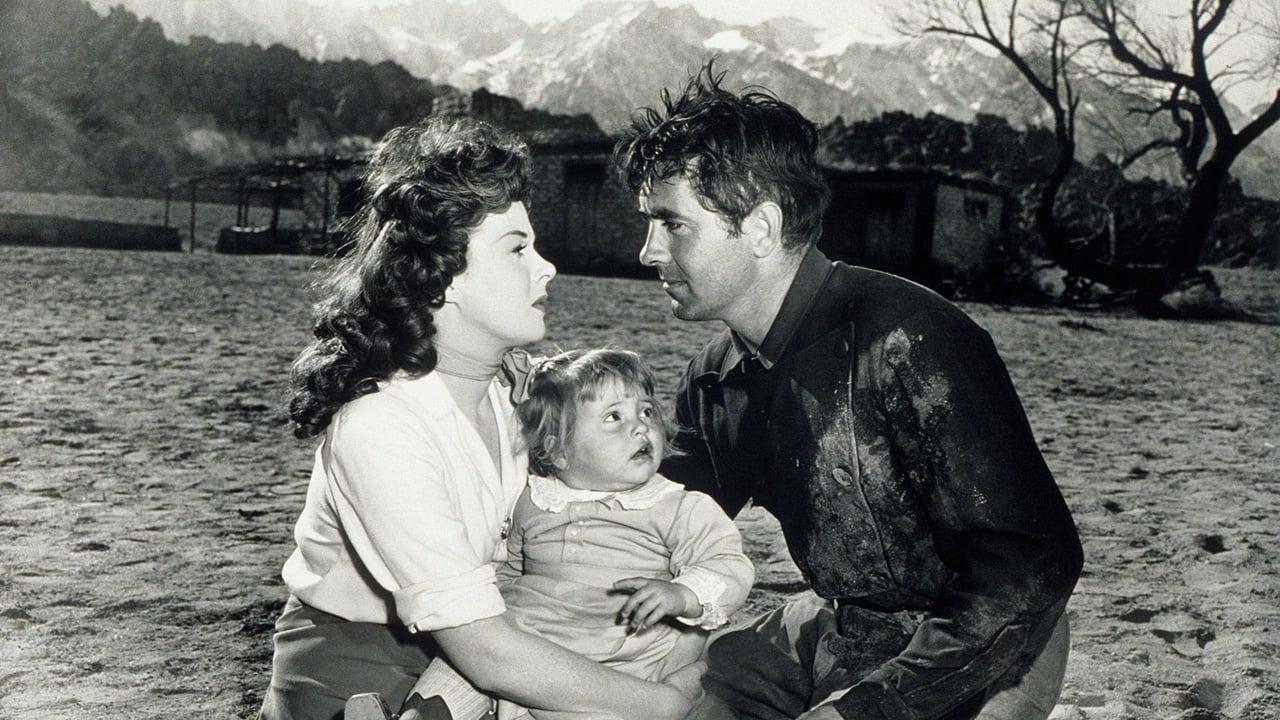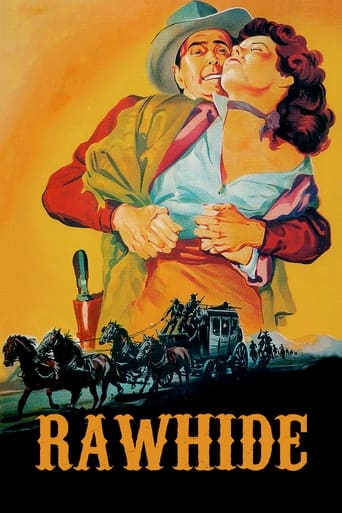



Intense, gripping, stylish and poignant
It's a good bad... and worth a popcorn matinée. While it's easy to lament what could have been...
View MoreIt's simply great fun, a winsome film and an occasionally over-the-top luxury fantasy that never flags.
View MoreAfter playing with our expectations, this turns out to be a very different sort of film.
View MoreI liked this film...with some reservations. But let's make it clear, while this is a better than average Western, it is not a Western classic.Let's begin with a few problems. First, why exactly did Susan Hayward come on so strongly defensive and unlikable at the beginning of the film? That was way overboard. Second, while this may be a minor point -- late in the film, a fall is so fake looking it was notable. Third, through the first part of the film, Tyrone Power is treated as if he is a teenager. He was a full grown man (age 37 at the time of filming), and as the film progresses, he pretends to be the husband of Susan Hayward. Come on Henry Hathaway (director), you can't have it both ways. And then there's the digging of the hole through the wall. Power and Hayward are laying on the floor in the dirt while doing the digging, and neither gets a bit dirty. That's just sloppy film making.On the other hand, the film opens and closes with some wonderful footage and narration of a stage coach route in spectacularly scenic country. That helped with a film that otherwise is somewhat claustrophobic since much of it takes place in the stage station. And the digging scenes become a drag in parts of the film; simply too much of it. And, there's enough twists that the film is not as predictable as many Westerns are.Tyrone Power is excellent here; he really was a superb actor. As I mentioned, I found Susan Hayward's acting at the beginning of the film to be over the top, but she calms down and does nicely after a while. Edgar Buchanan has a nice and somewhat subdued role as the station master...at least for a while. Hugh Marlowe is interesting as the chief villain here, which seems to be playing against type. Jack Elam is also over the top as a bad guy/pervert; this should have been toned down a bit. George Tobias is interesting as a Mexican-type outlaw; also against type. Dean Jagger seems totally out of place (and almost unrecognizable) as a soft-hearted (and perhaps slightly soft in the head) outlaw.A great Western? No. Too many flaws. But still a very good Western, which is worth watching. Recommended, with reservations.
View MoreLots of actors can't do westerns (e.g., Jimmy Cagney, Humphrey Bogart, Errol Flynn) and Tyrone Power shows us he can't do it either. What is surprising is that Henry Hathaway does such a poor job as the director, in a film that is neither fast paced, revealing, or interesting. Hathaway was one of the most prodigious makers of westerns, from the early 30s right up until my favorite Hathaway "Sons of Katie Elder" (1965). But he made a lot of bombs too, and this is clearly one of them.Of course you can't go too wrong with Susan Hayward along for the ride, and we get a chance to see Jack Elam at a time when his left eye seemed to be working.There are just too many good westerns from this period for you to spend your time on this one. Think John Ford's "Fort Apache" and "She Wore a Yellow Ribbon", Glenn Ford in "The Man from Colorado", Howard Hawks' "Red River", John Huston's "Treasure of the Sierra Madre", Gregory Peck in "The Gunfighter", etc. etc.
View MoreMore suggestive of such dark western films of the late 1940s as Pursued, than romantic brawlers by Hathaway like North To Alaska etc, this film is taut and suspenseful, well-acted and shot - just as one might expect from one of the great Hollywood studio professionals. In hindsight, it is obvious that the origins of Rawhide can be found in the director's earlier career, when he was involved with the noir cycle. After helming such classics as Kiss Of Death, and Call Northside 777, only a few short years before, it was natural for Hathaway to bring something of the same sensibility to an oater.Rawhide is scripted by Dudley Nichols who worked for John Ford among others, over a prestigious writing career. The story is a relatively simple one: a junior way station employee Tom Owens (Tyrone Power), and a woman Vinnie Holt (Susan Hayward), with her sister's child, are held captive by a small band of prison-escapees who are waiting to rob a gold shipment. Playing husband and wife to maximise their survival chances, Owens and Holt have to find a way to escape the vigilant and murderous ringleader Zimmerman (Hugh Marlowe) as well as warn the approaching stage. Further down the cast list there is also a splendidly evil part for Jack Elam as the deadly and lascivious Tevis, with eyes on Holt.Interestingly, the main action of the film is book-ended by a jaunty narrator, putting events into an historical context. This is a tale taken from the annals of the 'Jackass Mail', we are assured, a famous postal service which defied sceptics of the time to triumphantly link San Francisco and Saint Louis. But then the story shifts abruptly, to just a few people in the middle of nowhere, one of whom (Owens) has even yet to learn the business properly.After this step change, as trumpeted, 'Jackass Mail' appears just so much romantic hyperbole. It's the events at the way station which come to dramatise actual truths about convincing characters, even if they are often at a loss to control events. The irony is that, due to Nichols' skills as a dramatist and fine performances, we end up likely viewing the alleged history behind events as so much Hollywood window dressing, while the predations of the Zimmerman gang seem by far the more vivid and realistic. The 'real history' of sorts is displaced.As already mentioned, Hathaway's movie recalls the director's assignments earlier in his career. But Rawhide was also a modern, and for its time, relatively adult western attempting rounded characterisation. In a dramatic scheme familiar to the genre, character concerns regularly develop indoors while critical physical action is reserved for the open air. It's a film in which room-space in general, and doors in particular, play an important part. Players are confined within rooms, are repeatedly framed through, or walk back and forth, even die, in doorways; they spark off among themselves in a side room or the communal living area, while outside they rarely stray far.Once the Zimmerman gang arrive claustrophobia increases - a feeling helped by a sense that each room is really three-dimensional, closed in with a ceiling (reinforced by one noteworthy Citizen Kane-ish shot near the beginning). Doors and walls are uniformly sturdy, due to a fine location choice, in part of a real building. This way station offers an increasingly prison-like atmosphere - coming to a head as Owens and Holt ultimately attempt to tunnel out through the wall. In some senses, of course, the station is a penitentiary for everyone: whether for the Zimmerman gang, who have merely transferred their former penal relationships into a different setting or Vinnie Holt, wrongly condemned as an unmarried mother travelling with child to escape society's sanction, or Owens - whose restrictions means he cannot easily warn the approaching gold stage.The most interesting character in Rawhide is that of Vinnie Holt - stranded, with child, through company regulation. In a genre where women-kind are too often divided into contrasting or opposing stereotypes, of nice girl/ whore, bar girl/ respectable wife, and so on, Holt is more rounded, less dependent on the approval of others in general, and men in particular. A woman who is at first wrongly assumed to be of dubious virtue, lusted after by Tevis, and distrusted by Zimmerman, she is jealously protective of her sister's child, to the extent of being less bothered by other issues. Even before her true history is known, she gains the audience's respect through this single-minded independence, respect eventually matched by that of her temporary 'husband' Owens. Eventually she and he end up as a team for the mutual benefit of both, not coming together through easy romantic attachment. One feels it is a stronger bond and, given the nature of frontier life, a more likely one. Hayward's rare appearance in a western can be judged a success.The bond which grows between Owens and Holt, based on mutual respect, is in contrast to that connecting the Zimmerman gang. United by a dubious common background, the need to escape, greed, and respect enforced by fear, it is a union which is doomed to sunder. Zimmerman himself is allegedly unable to trust women (and in fact has been sentenced for killing one) after a tortured personal history. As Tevis says to him: "I ain't been cured of women... ain't had your medicine yet, Jim" - recognising that Zimmerman is unlikely to ever form a proper relationship with the wider world and implying that female-kind is some sort of sickness. Tevis himself has a brutal, leering fixation on the fairer sex, another direct contrast to Owens' basic decency and moral strength. Out of Zimmerman's confederates, only Yancy (Dean Jagger) has any strong humanity. It is a trait which, appositely enough; means he will survive.
View MoreWhat makes a western above average? A good story, good direction, good actors and good action scenes. Cinematography also, no doubt. Rawhide has all these elements, the story might seem conventional , but the characters played by Tyrone Power and Susan Hayward bring a new aspect , Hayward as the determined, sure of herself, woman who is carrying her sister's baby and Power as the rich boy who is spending some time at a stagecoach station to learn more about life. Hugh Marlowe as Zimmerman( remember Bob Dylan?), the bad guy who is not so bad, brings me to mind the westerns of Budd Boetticher, specially "The Tall T". But Jack Elam as Tevis is really sick and vicious. The stagecoach is driven by mules and takes more than 25 days from California to St. Louis. Every time it shows up you hear "Oh Susanna" on the sound track. Henry Hathaway sure knew how to make a western. He ranks among the best, on the same level as Anthony Mann and Budd Boetticher.
View More